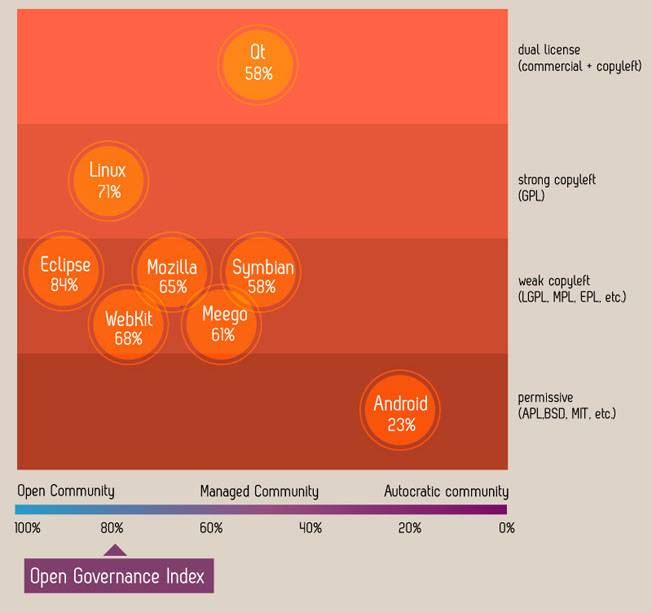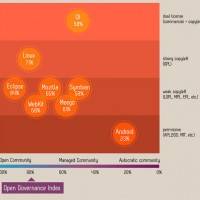
Google gets a lot of praise for bringing open source to the masses with Android, and a lot of flack for some of its more closed-off activities. On a technical level the company complies with the fundamental principles of open source software, but not always in the way that FOSS proponents would like. A perfect example is Android 3.0 Honeycomb, which never saw an open source release until version 4 was already available. These tendencies and more technical details led VisionMobile to rank it the “most closed” open source OS among a field of the most popular examples.
In a series of metrics, Google’s Android scored just 23% “open”, comparing poorly to the likes of Linux, Symbian and Meego. The running wasn’t limited to operating systems – Mozilla’s various open source tools, the Webkit browser framework and the QT user interface toolkit were also included. VisionMobile based their ratings on a variety of factors, such as the licenses used, the strictness by which the community is enforced, and the level of access that developers are given to the development process. For a more technical breakdown, head over to the source link above.
There’s no denying that Google keeps a pretty tight lid on Android, at least until the source code is released. In the case of the G1, original DROID, Nexus One, XOOM, Nexus S and Galaxy Nexus, only Google’s software engineers and its hardware partners had access to the software until well after a flagship device was released. On the other hand, Google’s aggressive promotion of Android has allowed it to become one of the most widely-used pieces of open source software in history, giving manufacturers, developers and tinkerers a complete and free ecosystem – eventually. VisionMobile concludes that Google’s promotional machine is a double-edged sword for Android, broadening its horizons while keeping its core interest well within the commercial spectrum.
[via BGR]












Now map it against market share.
curious to see if the correlation is there…and if it stretches to include iOS. perhaps market share is in direct correlation with “closeness”.
caveat: correlation does not imply causation.
IOS will not be included here, because it is not OPEN.
IOS will not be included here, because it is not OPEN.
IOS will not be included here, because it is not OPEN.
IMO they should make up their minds, either make it OPEN or closed, now they try to do it both ways, and it sucks just as Google sucks at mobile… http://baretech.wordpress.com/2011/12/12/the-mighty-will-fall-google-isnt-innovative-in-mobile/ maybe splitting Android to 2 different projects(fully open and closed on Motorola) would be an answer, today
IMO they should make up their minds, either make it OPEN or closed, now they try to do it both ways, and it sucks just as Google sucks at mobile… http://baretech.wordpress.com/2011/12/12/the-mighty-will-fall-google-isnt-innovative-in-mobile/ maybe splitting Android to 2 different projects(fully open and closed on Motorola) would be an answer, today
IMO they should make up their minds, either make it OPEN or closed, now they try to do it both ways, and it sucks just as Google sucks at mobile… http://baretech.wordpress.com/2011/12/12/the-mighty-will-fall-google-isnt-innovative-in-mobile/ maybe splitting Android to 2 different projects(fully open and closed on Motorola) would be an answer, today